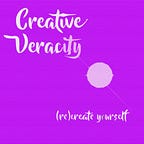Koan Kreativity XIV
Using Ancient Wisdom to Inspire Modern Creativity
Presented as either a riddle or tale, the koan is instrumental to the Zen student’s path to enlightenment; by opening and freeing the mind from both outer and inner restrictions, the “empty mind” of the Zen student is more open to insight and realization that could be achieved in no other way.
As artists and creative people we, too, need the benefit of an “empty mind.” Our own creative insights and realizations become more tangible and workable when we clear away the clutter of fear, apathy, negativity, and all other potentially destructive restrictions that we may have learned in our lives.
__________
Storyteller’s Zen
Encho was a famous storyteller. His tales of love stirred the hearts of his listeners. When he narrated a story of war, it was if the listeners themselves were on the field of battle.
One day Encho met Yamaoka Tesshu, a layman who had almost embraced masterhood in Zen. “I understand,” said Yamaoka, “you are the best storyteller in our land and that you make people cry or laugh at will. Tell me my favorite story of the Peach Boy. When I was a little tot I used to sleep beside my mother, and she often related this legend. In the middle of the story I would fall asleep. Tell it to me just as my mother did.”
Encho dared not attempt to do this. He requested time to study. Several months later he went to Yamoaka and said: “Please give me the opportunity to tell you the story.”
“Some other day,” answered Yamoaka.
Encho was keenly disappointed. He studied further and tried again. Yamoaka rejected him many times. When Encho would start to talk Yamaoka would stop him, saying: “You are not yet like my mother.”
It took Encho five years to be able to tell Yamaoka the legend as his mother had told it to him.
In this way, Yamaoka imparted Zen to Encho.
* * *
At first glance, Storyteller’s Zen might appear to be a koan about imitation and melding our voices with the voices of others. Encho is asked by Yamaoka to tell the story of Peach Boy exactly the way that Yamaoka’s mother did when Yamaoka was a child.
Yet this koan isn’t about imitation; it’s about being fully immersed in the Zen (and the creative) process, no matter how long it takes — while learning how to be true to ourselves and our one True Voice.
As artists and creative people, we have the duty of “getting it right” with our creative work by being ourselves. To try and imitate others is a disservice to them and to ourselves.
Encho’s mistake was found in trying to imitate the voice — and the essence — of Yamaoka’s mother (an impossible task) rather than staying true to the story itself (and to himself). Once Encho recovered his own True Voice — and essence — he was able to tell the story of the Peach Boy in a way in which Yamaoka appreciated.
In the words of Ralph Waldo Emerson: “Imitation is suicide.”
